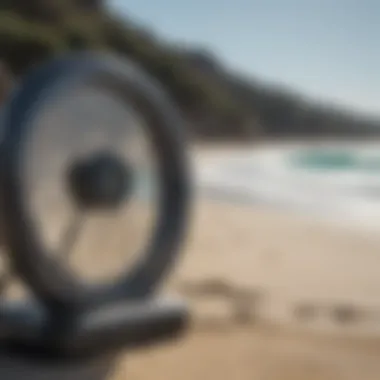Enhancing Surfing Experience with an Anemometer: A Must-Have for Enthusiasts


Surfboarding Techniques
An empty surfboard glimmers in the morning light, awaiting the footsteps of a skilled rider ready to embark on an exhilarating journey through the waves. Before delving into the intricacies of purchasing an anemometer, understanding key surfboarding techniques is paramount. From mastering the art of the 'Pop-up Technique' to executing the precise 'Bottom Turn Maneuver,' surfers sculpt their craft with each wave conquered. The graceful 'Cutback' and strategic 'Duck Diving' techniques symbolize the elegant dance between surfer and ocean, highlighting the sophistication inherent in surfing.
Surfboard Maintenance and Care
As the sun sets on a breathtaking surf session, the diligent surfboarding enthusiast must turn their attention to the vital aspect of surfboard maintenance and care. From meticulously cleaning the surfboard with gentle precision to adeptly repairing any dings or cracks that may impede performance, caring for a surfboard is a labor of love. The judicious application of wax to ensure optimal traction, the art of changing fin setups to suit varied wave conditions, and the importance of storing the surfboard properly to prolong its lifespan form the cornerstone of responsible surfboard ownership.
Surfing Destinations and Travel Tips
The allure of distant shores beckons to the intrepid surfer, enticing them with promises of waves undiscovered and cultures unexplored. Venturing into uncharted waters requires a keen eye for top surfing spots globally, meticulous research in choosing the right surfing destination, and a comprehensive surf trip planning guide to navigate the complexities of travel. Safely surfing abroad demands a nuanced understanding of local surfing customs and etiquettes, as immersing oneself in diverse surfing cultures enhances the overarching surfing experience.
Surfboard Gear and Equipment
Equipped with knowledge of surfboarding techniques, a well-maintained board, and a thirst for adventure, surfers now traverse the realm of surfboard gear and equipment. From the sleek agility of shortboards to the graceful glide of longboards, understanding the dynamics of surfboard types is instrumental in honing one's craft. Essential accessories like leashes, fins, and wetsuits serve as the unsung heroes of a surf session, while selecting the right surfboard tailored to individual skill levels represents a pivotal juncture in a surfer's journey. Embracing surfing technology and innovation underscores the symbiosis between tradition and progress in the ever-evolving world of surfing.
Introduction
Surfboarding enthusiasts seeking to elevate their surfing experiences often turn to anemometers, key devices that play a crucial role in optimizing wave riding conditions. An integral part of the surfing arsenal, anemometers provide surfers with precise wind speed measurements, enabling them to assess and choose the most favorable surfing spots. By delving into the world of anemometers, surfers can gain a deeper understanding of how these instruments can significantly impact their surfing adventures.
Overview of Anemometers
What is an Anemometer?
An anemometer, an essential tool for surfboarding aficionados, is a device specifically designed to measure the speed of the wind. With its ability to accurately capture wind velocity, the anemometer equips surfers with crucial information for evaluating wind conditions before hitting the waves. Its compact size and ease of use make it a sought-after companion for surfers looking to enhance their surfing expeditions. Despite its simplistic design, the anemometer's role in providing real-time wind data is unparalleled in the world of surfing.
Importance in Surfboarding
The importance of anemometers in the realm of surfboarding cannot be overstated. By giving surfers access to precise wind speed readings, anemometers empower them to make informed decisions regarding wave selection and surfing locations. This capability enables surfers to identify prime wave conditions, thereby elevating their surfing performance to new heights. Anemometers act as guiding beacons for surfers, enabling them to strategize and optimize their surfing experiences by harnessing the power of wind data.
Benefits of Using an Anemometer
Enhanced Wind Speed Measurement
Accurate Data Collection
Real-time Updates


Improved Wave Selection
Identifying Optimal Wave Conditions
Enhancing Surfing Performance
Factors to Consider Before Buying an Anemometer
Accuracy and Precision
Quality of Sensors
Calibration Standards
Portability and Durability
Size and Weight
Resistance to Outdoor Elements
User-Friendly Features
Ease of Operation
Data Interpretation
Top Anemometers Recommended for Surfboarding Enthusiasts
Model 1: Advanced Wind Tracker
Features and Specifications
User Reviews
Conclusion
Optimizing Surfing Experiences with Anemometers
Empowering Surfers with Data-driven Decisions


Maximizing Wave Riding Potential
Benefits of Using an Anemometer
An anemometer serves as a fundamental tool for surfboarding enthusiasts, revolutionizing their surfing experience by providing crucial wind speed measurements. These measurements play a pivotal role in deciding ideal surfing conditions, ensuring surfers make informed choices about when and where to hit the waves. The acquisition of an anemometer significantly enhances the precision and accuracy of wind speed readings, thus empowering surfers to optimize their surfing sessions through data-driven decision-making processes. Understanding the benefits associated with using an anemometer is essential as it heralds a new era of enriched surfing experiences for enthusiasts seeking to elevate their performance levels.
Enhanced Wind Speed Measurement
Accurate Data Collection
Accurate data collection is a cornerstone element when it comes to utilizing an anemometer for surfboarding purposes. The precision of data gathered directly impacts the surfer's ability to assess wind conditions thoroughly, allowing for strategic decisions on wave selection. An anemometer renowned for its accurate data collection capabilities ensures that surfers can rely on the information provided to tailor their surfing strategies accordingly. The trustworthiness and dependability of accurate data collection are paramount in the realm of surfboarding as it dictates the success and enjoyment of surfing endeavors.
Real-time Updates
In the realm of surfboarding, real-time updates are an indispensable feature that any proficient anemometer should offer. These updates provide surfers with immediate information about wind speed variations, allowing them to adapt swiftly to changing conditions. A robust anemometer that offers real-time updates equips surfers with the agility to seize opportunities presented by sudden shifts in wind speed, thereby enhancing their overall surfing experience. The instantaneous nature of real-time updates not only fosters quicker decision-making but also ensures that surfers can maximize their time on the waves efficiently.
Improved Wave Selection
Identifying Optimal Wave Conditions
Identifying optimal wave conditions is a pivotal aspect influenced by using an anemometer for surfboarding. The ability to pinpoint the most favorable wave conditions enables surfers to make calculated choices regarding when and where to surf, thus enhancing their overall surfing performance. An anemometer that excels in identifying optimal wave conditions empowers surfers to capitalize on prime surfing opportunities, leading to heightened enjoyment and satisfaction on the water. The precision and consistency offered by an anemometer in identifying optimal wave conditions contribute significantly to elevating the surfing experience for enthusiasts seeking to fine-tune their skills.
Enhancing Surfing Performance
Enhancing surfing performance is a primary goal for surfboarding enthusiasts, and an anemometer plays a pivotal role in achieving this objective. By providing accurate and real-time data on wind speed, an anemometer aids surfers in making strategic decisions that can amplify their surfing capabilities. The data-driven insights derived from an anemometer allow surfers to optimize their surfing techniques, adapt to changing conditions swiftly, and maximize their riding potential on the waves. The integration of an anemometer in surfing endeavors not only enhances performance but also cultivates a deeper appreciation for the dynamic relationship between wind conditions and surfing proficiency.
Factors to Consider Before Buying an Anemometer
Accuracy and Precision
Quality of Sensors
Discussing the quality of sensors in an anemometer is paramount in guaranteeing precise wind speed measurements. High-quality sensors contribute significantly to the device's overall accuracy, providing surfers with reliable data for making informed decisions. The key characteristic of quality sensors lies in their ability to capture subtle changes in wind speed with great precision, ensuring that surfers can trust the data they receive. Despite some potential disadvantages such as higher cost, the advantages of accurate sensor readings far outweigh any drawbacks, making it a popular choice among surfboarding enthusiasts.
Calibration Standards
Calibration standards are another essential aspect to consider when selecting an anemometer. These standards ensure that the device maintains its accuracy over time by properly aligning it with known reference points. By adhering to calibration standards, surfers can rely on consistent and reliable data for wind speed measurements. The unique feature of calibration standards lies in their ability to adjust the anemometer's readings to match external conditions, reducing errors and improving data accuracy. While adhering to calibration standards may require additional effort, the benefits of consistent and precise readings make it a worthwhile choice for surfers seeking reliable weather data.
Portability and Durability


Size and Weight
The size and weight of an anemometer are significant factors to consider, especially for surfboarding enthusiasts who need a portable device that does not hinder their performance. A compact and lightweight design allows surfers to carry the anemometer with ease, whether traveling to different surfing spots or using it on the go. The key characteristic of size and weight lies in finding the right balance between portability and functionality, ensuring that the device is easy to handle without compromising its performance. While lightweight anemometers may be more prone to damage, their convenience and ease of use make them a popular choice among surfers seeking effortless wind speed measurements.
Resistance to Outdoor Elements
An anemometer's resistance to outdoor elements is critical for its longevity and reliable performance in various weather conditions. Being exposed to elements such as water, sand, and sunlight, the device must be designed to withstand these challenges without compromising its functionality. The key characteristic of resistance to outdoor elements lies in the anemometer's construction materials and protective features, ensuring durability and longevity in harsh environments. By choosing an anemometer that is resistant to outdoor elements, surfers can trust that their device will continue to provide accurate data even in demanding conditions.
User-Friendly Features
Ease of Operation
User-friendly features, such as ease of operation, greatly impact the overall usability of an anemometer. Surfboarding enthusiasts require a device that is intuitive and straightforward to use, allowing them to focus on their surfing experience rather than figuring out complicated functions. The key characteristic of ease of operation lies in the device's interface and control system, making it simple for surfers to operate the anemometer with minimal effort. Despite some potential disadvantages such as limited advanced features, the advantages of easy operation make it a preferred choice for surfers who prioritize simplicity and efficiency.
Data Interpretation
Efficient data interpretation is key to unlocking the full potential of an anemometer for surfboarding enthusiasts. The device's ability to present wind speed data in a clear and actionable format is essential for surfers to make quick decisions based on real-time information. The key characteristic of data interpretation lies in the anemometer's display features and data analysis capabilities, allowing surfers to understand the wind conditions easily. By choosing an anemometer with robust data interpretation features, surfers can maximize their surfing potential by leveraging accurate data for strategic wave selection and overall performance improvement.
Top Anemometers Recommended for Surfboarding Enthusiasts
An essential part of any surfer's gear is a reliable anemometer. Top anemometers play a crucial role in enhancing the surfing experience by providing accurate wind speed measurements and helping surfers identify optimal surfing conditions. These devices offer surfers the ability to make informed decisions about when and where to hit the waves, ensuring a safe and enjoyable surfing session. When considering top anemometers for surfboarding enthusiasts, key elements to focus on include the quality of sensors, calibration standards, portability, durability, user-friendly features, and overall performance. Selecting the right anemometer can significantly impact a surfer's ability to maximize their time on the water and catch the best waves. Investing in a top-tier anemometer can provide surfers with a competitive edge, allowing them to hone their skills and take their surfing to the next level. By choosing a high-quality device with advanced features, surfers can optimize their wave-riding experiences and stay ahead of changing wind and wave conditions.
Model 1: Advanced Wind Tracker
Features and Specifications
The Model 1 Advanced Wind Tracker boasts a range of cutting-edge features and specifications that cater to the specific needs of surfboarding enthusiasts. With a focus on precision and accuracy, this anemometer provides reliable wind speed measurements in real-time, allowing surfers to adjust their strategy on the go. Its compact design and user-friendly interface make it a popular choice among riders looking to enhance their surfing performance. The key characteristic of the Advanced Wind Tracker is its ability to deliver precise data on wind speed, direction, and gusts, giving surfers valuable insights into the current conditions. This feature is especially beneficial for surfers seeking to optimize their wave selection and make the most of every surfing session. While the device excels in providing detailed wind information, some users may find its interface slightly complex to navigate, requiring a brief learning curve to fully utilize its capabilities.
User Reviews
User reviews of the Model 1 Advanced Wind Tracker highlight its reliability and accuracy in measuring wind conditions, with many surfers praising its performance in varying weather conditions. The device's compact size and durable construction make it a practical choice for surfers who frequently brave the elements. However, some users have noted that the device's battery life could be improved for longer surfing sessions, suggesting the need for occasional recharging between uses.
Conclusion
When delving into the realm of anemometers for surfboarding enthusiasts, the topic of Conclusion holds paramount significance. This section serves as the summation of all insights and recommendations provided throughout the article, offering a final perspective on the implications of integrating anemometers into surfing practices. Understanding the importance of Conclusion entails grasping the actionable steps surfers can take to optimize their surfing experiences. By synthesizing the data-driven decisions facilitated by anemometers, surfers can enhance their wave riding potential and elevate their overall performance in the water. This section intricately weaves together the benefits of anemometer utilization with practical implications for surfers seeking to elevate their skills to a new level.
Optimizing Surfing Experiences with Anemometers
Empowering Surfers with Data-driven Decisions
The aspect of Empowering Surfers with Data-driven Decisions stands as a foundational pillar within the context of integrating anemometers into surfing pursuits. This component emphasizes the pivotal role data plays in enabling surfers to make informed choices regarding when and where to engage in their water activities. One key characteristic of empowering surfers lies in the real-time updates provided by anemometers, offering accurate wind speed measurements that directly impact wave selection processes. This informed decision-making approach not only enhances surfing experiences but also cultivates a heightened sense of control and awareness among surfers. The unique feature of empowering surfers with data-driven decisions is its ability to revolutionize traditional surfing practices, shifting the focus towards a more calculated and strategic approach to wave riding. Surfers leveraging this feature gain a competitive edge by harnessing precise data to optimize their performances, although a potential disadvantage may arise in over-reliance on technological inputs, potentially detracting from the organic essence of surfing.
Maximizing Wave Riding Potential
Within the realm of optimizing surfing experiences, the facet of Maximizing Wave Riding Potential emerges as a critical element influencing the overarching goal of performance enhancement. This facet places emphasis on identifying optimal wave conditions through the utilization of anemometers, enabling surfers to select prime surfing spots with maximum wave efficiency. A key characteristic of maximizing wave riding potential is its ability to significantly boost surfing performance by aligning surfer skills with ideal wave conditions. This choice proves beneficial due to its direct impact on enhancing the overall surfing experience, allowing surfers to capitalize on favorable wind patterns and wave formations. The unique feature of maximizing wave riding potential lies in its capacity to fine-tune surfing strategies based on accurate wind speed data, thereby elevating the skills and accomplishments of surfers. Despite its advantages in offering tailored surfing experiences, potential disadvantages may arise if surfers become overly reliant on anemometer readings, potentially limiting their adaptability to diverse wave conditions.







